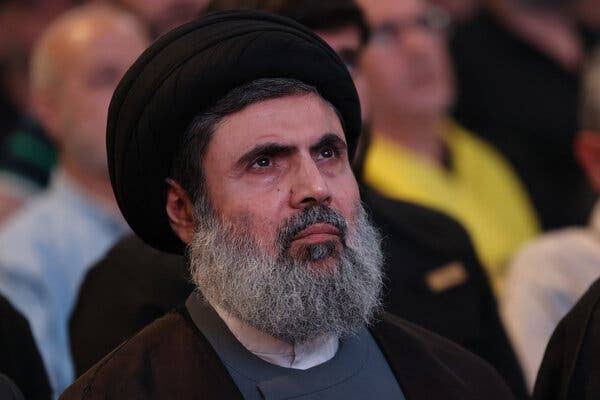Hashem Safieddine, a significant figure within Hezbollah, is considered the most likely successor to his cousin, Hassan Nasrallah, the current leader of the Lebanese militant group.

His close familial ties to Nasrallah, along with his long-standing role in Hezbollah’s leadership, make him a central figure to watch as the organization navigates a potentially pivotal leadership transition.
Safieddine’s rise to prominence is deeply rooted in the history of Hezbollah, his relationship with Iran, and his influential position within the group's hierarchy.
Early Life and Connection to Hezbollah
Hashem Safieddine was born in the late 1950s or early 1960s and is several years younger than Nasrallah. Both men share a deep familial connection, as they are cousins on their maternal side.
Safieddine joined Hezbollah shortly after its formation in the early 1980s, a period marked by Lebanon’s civil war and the Israeli occupation of southern Lebanon.
At the time, Hezbollah was a fledgling Shiite movement supported by Iran’s Revolutionary Guards, and its early members, including Safieddine, were devoted to the concept of "resistance" against Israeli forces and Western influence in the region.
Safieddine quickly rose through Hezbollah’s ranks, becoming one of its most trusted and influential leaders.
His religious education in Iran further cemented his ideological alignment with the organization’s goals, and his political savvy helped solidify his position within Hezbollah’s leadership.
As Hezbollah grew from a small insurgent group into a powerful political and military force in Lebanon, Safieddine's role within the organization expanded accordingly.
Leadership Role in Hezbollah
Safieddine currently serves as the head of Hezbollah’s Executive Council, a key position that involves overseeing many of the group’s internal operations, including its social, political, and financial activities.
This role places him in charge of much of Hezbollah’s day-to-day governance, and it also underscores his importance within the organization’s broader structure.
In addition to his position on the Executive Council, Safieddine is a member of Hezbollah’s Shura Council, the group’s highest decision-making body.
The Shura Council is responsible for setting Hezbollah’s strategic direction, making policy decisions, and, crucially, electing a new leader if Nasrallah steps down or dies.
Safieddine’s role on this council makes him one of the most powerful figures in Hezbollah, and his inclusion in this elite group positions him as the most likely successor to Nasrallah.
Ties to Iran and Regional Influence
One of the key factors behind Safieddine’s rise within Hezbollah is his close ties to Iran, which has been Hezbollah’s primary backer since its inception.
Safieddine spent time in Iran during his religious studies, where he developed a strong relationship with the Iranian leadership, including the late General Qasem Soleimani, who headed the Quds Force, the foreign operations arm of Iran’s Islamic Revolutionary Guard Corps (IRGC).
Safieddine’s son is married to Soleimani’s daughter, further solidifying the connection between the Safieddine family and Iran’s political and military elite.
These ties to Iran are a crucial aspect of Safieddine’s influence within Hezbollah, as Iran provides the group with financial support, military training, and political backing.
Safieddine’s strong relationship with Tehran ensures that he would likely continue Hezbollah’s close alignment with Iran if he were to take over the leadership.
Designation as a Terrorist
In 2017, the United States and Saudi Arabia designated Hashem Safieddine as a terrorist, citing his role in Hezbollah’s global operations.
The U.S. Treasury described him as a senior leader within the organization and a key member of Hezbollah’s executive team.
According to the U.S. government, Safieddine was involved in Hezbollah’s efforts to expand its influence across the Middle East and beyond, including its involvement in the Syrian civil war, where Hezbollah fighters have supported the regime of President Bashar al-Assad.
This designation highlights Safieddine’s role not only as a political leader within Hezbollah but also as a figure involved in the group’s military activities and regional operations.
Hezbollah’s involvement in Syria has been a significant factor in its continued prominence in the Middle East, and leaders like Safieddine have played a key role in shaping the group’s strategy in the conflict.
The Succession Question
The question of who will succeed Hassan Nasrallah has been a topic of speculation for several years, particularly as Nasrallah’s health has reportedly been in decline.
While Nasrallah remains the undisputed leader of Hezbollah, there have been increasing discussions about the future of the group’s leadership, especially given the challenges it faces both internally and externally.
If Nasrallah were to step down or pass away, the process for selecting a new leader would fall to Hezbollah’s Shura Council, which would meet to elect a new secretary-general.
While Hezbollah’s deputy leader, Naim Qassem, would automatically take over leadership in the interim, Safieddine is widely seen as the most likely candidate for the permanent position.
Analysts point to several factors that make Safieddine the strongest contender.
First, his long-standing role within Hezbollah’s leadership and his position on the Shura Council give him significant authority within the organization.
Second, his close ties to Iran ensure that he has the backing of Hezbollah’s most important ally.
Finally, his ability to maintain a public profile, despite Hezbollah’s often secretive nature, suggests that he has the charisma and leadership skills needed to lead the group in the post-Nasrallah era.
Unlike Nasrallah, who has spent much of his time in hiding due to security concerns, Safieddine has made several public appearances in recent years.
He has been seen at political and religious events in Lebanon, including the funerals of Hezbollah fighters who have been killed in clashes with Israel.
During these events, Safieddine has often used fiery rhetoric to rally support for Hezbollah’s resistance efforts and to reaffirm the group’s commitment to its military and political goals.
In a speech delivered in 2024, Safieddine spoke about Hezbollah’s resilience and the importance of leadership succession within the group.
He emphasized that when a leader is martyred, another leader will step up to continue the fight with renewed determination.
This statement has been interpreted by many as a signal of Safieddine’s readiness to take over the leadership if Nasrallah were to step down.
Hashem Safieddine’s position within Hezbollah, his strong ties to Iran, and his leadership experience make him the most likely successor to Hassan Nasrallah.
As Hezbollah continues to face challenges both from within Lebanon and from external forces, the question of leadership succession will become increasingly important.
Safieddine’s rise through the ranks of Hezbollah and his close relationship with the Iranian leadership suggest that he would be well-positioned to lead the group in the future.
